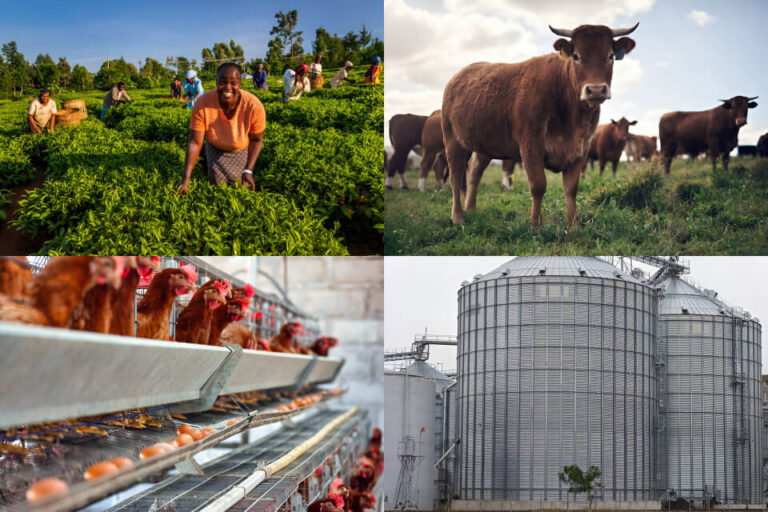- Introduction
- How Venture Capital Supports Agribusiness Innovations
- Success Stories of Agripreneurs Funded by Venture Capital
- Challenges in Securing Venture Capital for Agribusiness
- The Role of Venture Capital in Sustainable Agriculture
- Future Trends in Agripreneurship and Venture Capital
- Frequently Asked Questions (FAQs)
- Conclusion
Introduction
Venture capital is changing the game for young farmers and agribusiness owners in Africa. These young agripreneurs are bringing fresh ideas to farming. They are creating jobs, using new technology, and helping to solve food problems across the continent.
But to grow their ideas into successful businesses, they need more than passion—they need money and support. That’s where venture capital comes in. In this article, you’ll learn about the impact of venture capital on African agripreneurs, why it matters, and how it’s turning agriculture into a strong force for economic growth.
Overview of African Agripreneurship
Across Africa, many young people are stepping into agriculture—but with a twist. Instead of using old, slow methods, they are turning farming into real businesses. These agripreneurs use smart ideas, new tools, and better ways to grow and sell food. Some run farms, while others build companies that process food, sell it, or make farming easier through tech. As a result, they are helping farming move forward. Even better, they’re creating jobs for other young people too.
Importance of agriculture to Africa’s economy
Farming is a big deal in Africa. It gives work to over 60% of the people and adds about 22% to the continent’s income. More than just feeding people, agriculture helps families earn a living, especially in rural areas. That’s why improving farming is so important. When more money goes into farming, it grows the economy, puts more food on the table, and helps reduce poverty. With better tools and smart business ideas, Africa’s large farmlands can create wealth and give young people hope for a better future.
The Rise of Agripreneurs and Agribusiness Startups
Over the last few years, many new farming businesses have popped up across Africa. These businesses, called agribusiness startups, use technology (like phones and apps), and smart ideas to solve problems. For example, they help farmers sell faster, get loans, or find better prices. Agripreneurs are not just growing food—they are also processing, packaging, and delivering it. Because of all this, more investors and groups are now interested in farming. This attention is helping the farming sector grow even faster.
Definition and Role of Venture Capital
Venture capital is money that goes to new businesses that can grow fast. Unlike bank loans, venture capital investors don’t ask for repayment. Instead, they take a share of the business and help it grow. This help includes money, advice, contacts, and support. For African agripreneurs, this is a big deal. It allows them to buy better tools, hire more people, and reach more customers. It also helps them solve tough problems like poor roads or weak markets by connecting them to experts and resources.
Why Venture Capital matters for African Agribusiness
Venture capital makes a huge difference in African farming. It supports new ideas, helps businesses grow, and creates jobs. It also helps solve common problems in farming, like lack of money and tough rules. When agripreneurs get venture capital, they can build stronger businesses and reach more customers. Even better, they can help more people, feed more families, and grow their country’s economy. So, learning how to talk to investors and how to get their support is very important for young farmers who want to succeed.
In short, venture capital is helping to change farming in Africa. It’s not just about giving money—it’s about building strong businesses that feed people, create jobs, and grow the economy.

How Venture Capital Supports Agribusiness Innovations
Venture capital is making a big difference in African farming. It’s giving young agribusinesses the money and support they need to grow fast, solve real problems, and change the way farming works. In this article, let’s look at how venture capital helps farmers and agripreneurs come up with smart ideas that are already making farming better across Africa.
Introduction to agribusiness innovation in Africa
Agribusiness innovation means using new ideas and tools to make farming and food production better. Right now in Africa, many young people are starting businesses that use things like mobile apps, drones, and smart tools. These help farmers grow more food, earn more money, and waste less. However, they can’t do it alone. They need support. This is where venture capital comes in—it gives them the funding and help they need to grow their ideas into real businesses.
Types of innovations being funded
Many exciting ideas are being supported by venture capital. For example:
- Mobile apps that connect farmers straight to buyers. This helps farmers earn more by cutting out middlemen.
- Financial tools that give farmers loans and insurance using their phones.
- Smart farming gadgets like drones and sensors that help farmers know when to plant, water, or harvest.
- Shared tractor services, which allow small farmers to rent tractors instead of buying one.
All of these ideas make farming easier, faster, and more profitable.
How funding accelerates innovation
Venture capital doesn’t just give money. It also gives advice and business support. This helps agripreneurs improve their ideas, grow their teams, and reach more farmers. With this support, they can try out their ideas faster and avoid making costly mistakes. Without venture capital, many of these amazing ideas would never get a chance to grow.
Examples of startups introducing new solutions
Across Africa, there are many agribusiness startups already making a difference. Here are some:
- Twiga Foods (Kenya): With over $100 million in funding, they built a platform that connects farmers to city markets. This reduces food waste and helps farmers earn more.
- Hello Tractor (Nigeria): They let farmers rent tractors through a mobile app. This makes it easier for small farmers to get work done quickly.
- Apollo Agriculture (Kenya): They use mobile phones and data to give small farmers access to seeds, credit, and training.
These startups show what’s possible when big ideas get the support they need.
The role of technology and research in funded agribusinesses
Venture capital also helps startups work with universities and research centers. These partnerships help them create better farming tools and methods. For example, some use research to grow crops that can survive dry weather. Others build tools that use data to help farmers make smart decisions. Because of this, the businesses last longer and do better in the long run.
Success Stories of Agripreneurs Funded by Venture Capital
Highlighted African agripreneurs and their journeys
When you look at how farming is changing across Africa, you’ll see many exciting stories. These changes are not happening by chance. Venture capital—money and support from investors—is helping agripreneurs grow their businesses, solve real problems, and make a difference. Now, let’s dive into the stories of some agripreneurs, how they used venture capital, and what others can learn from them.
How Venture Capital Transformed Their Operations
Many African agripreneurs have turned simple ideas into powerful businesses. For example:
- Twiga Foods (Kenya) connects farmers with city shops, helping them get fair prices and waste less food.
- Hello Tractor (Nigeria) works like Uber, but for tractors. Farmers can rent tractors when they need them.
- Thrive Agric (Nigeria) helps farmers get loans and farm tools through their phones.
- Faith Timona Mumo (Kenya) runs Iviani Farm Limited, turning fresh fruits into tasty, dried snacks.
- Washington Maina (Kenya) founded Centro Energy Limited, focusing on fish farming, clean energy, and the environment.
Each of them is tackling tough problems like market access, technology use, and post-harvest losses—and making real progress.
The Scale and Reach after Funding
Once they received funding, a lot started to change. Here’s how:
- They grew Bigger and Faster: With more money, they could reach more farmers and customers.
- All Improved Their Tech: They used the funding to build better tools and systems for farming.
- They Reached New Markets: They were able to connect farmers with more buyers.
- All Worked Smarter: They used money to cut down waste and make things run smoothly.
So, not only did they grow, but they also became stronger and more efficient.
Key Lessons from Successful Agripreneurs
Along the way, these agripreneurs learned lessons that others can follow:
- Use Technology Wisely: Tools like mobile apps and sensors can make a big difference.
- Solve Real Problems: Start with challenges that farmers actually face every day.
- Work Together: Partner with other groups and businesses to grow faster.
- Understand Your Environment: Every region is different, so build solutions that match local needs.
- Think About the Future: Create systems that protect nature and will last for years.
These lessons can help any new agripreneur start on the right foot.
Sectors within Agriculture Benefiting the Most
Venture capital isn’t going to just one part of farming. It’s helping in many ways:
- Agri-tech: Startups that use phones, apps, and data to help farmers do better.
- Logistics and Transport: Companies that move food quickly and reduce waste.
- Finance: Businesses that give farmers access to loans, savings, and insurance.
- Processing and Packaging: Farms and companies that turn raw crops into finished products.
Each of these areas is important, and each one is growing fast thanks to venture capital.

Challenges in Securing Venture Capital for Agribusiness
Venture capital can really help African agripreneurs grow their businesses. However, getting that funding is not always easy. So, let’s look at the major issues and smart ways agripreneurs can attract investors.
Perceived Risks in Agribusiness Investment
First, many investors think farming is too risky. That’s because farming depends on things like the weather, pests, and long growing seasons. Often, farmers spend a lot of money at the start of the season, but they don’t make any money until after harvest. This can lead to slow or uneven profits. As a result, many investors choose sectors like fintech or energy instead, since they seem safer. But even though agriculture has huge potential, it still gets less attention.
Lack of Investor Understanding of the Agriculture Sector
Next, a lot of investors simply don’t understand how African farming works. They might expect fast results or big profits right away. But most agribusinesses are small and still growing. So, this mismatch creates problems. Agripreneurs need to explain their business clearly and show why it matters. At the same time, investors must take time to learn about farming. Bridging this gap is very important if the sector is going to grow.
Limited Access to Networks and Pitch Opportunities
Another major challenge is access. Many agripreneurs don’t know where to find investors or how to get invited to pitch events. Often, investors discover startups through friends or formal events. But what about those in rural areas or just starting out? Without access to networks, many strong businesses never get noticed. So, it’s very important to attend events, build relationships, and join agribusiness groups that can help connect you with funders.
Legal and Regulatory Barriers
Legal and government issues can also scare off investors. For example, land ownership rules can be confusing. Sometimes, government policies change too often. Corruption also creates fear. All of these make investors nervous because they want their money to be safe. When laws aren’t clear or the system isn’t stable, it’s harder to raise capital. So, fixing these problems is key if we want more investment in agribusiness.
Strategies Agripreneurs Can Use to Attract Funding
Even with all these challenges, agripreneurs can still do a lot to get funding. Here are some good ideas:
- Create a strong, clear business plan that shows how your business will grow and make money.
- Use smart tools and apps to make farming easier and collect useful data.
- Join networks by going to events and talking to investors.
- Work with trusted partners like NGOs or government programs to build trust.
- Follow legal rules to help investors feel safe about putting their money in your business.
The Role of Venture Capital in Sustainable Agriculture
Venture capital does more than just provide money to African agripreneurs. It also supports farming methods that protect the environment and make sure people have enough food in the future. With the help of venture capital, agribusinesses can use greener methods, handle climate change better, and build stronger food systems that last.
Promoting Environmentally Friendly Practices
First of all, venture capital encourages farmers to use clean and safe farming practices. These include organic farming, using fewer chemicals, and recycling farm waste. Many investors prefer startups that take care of nature by protecting the soil, keeping water clean, and saving plants and animals. As a result, farms can stay healthy and productive for years to come.
Supporting Climate-smart Agriculture Innovations
Climate change is already making farming harder in Africa. That’s why venture capital supports businesses that come up with smart ways to deal with it. For example, some startups create drought-resistant seeds, better irrigation systems, and mobile apps that give weather updates. These tools help farmers stay ahead of bad weather and grow more food with less harm to the planet.
Enabling Long-term Solutions for Food Security
In addition, venture capital helps make food systems better. It funds businesses that cut food waste, improve storage, and connect farmers directly to markets. When more food reaches people instead of getting spoiled, everyone benefits. This support helps Africa build a food system that works for more people and lasts into the future.
Encouraging Responsible Use of Natural Resources
Venture capital also encourages startups to take good care of natural resources like water, land, and energy. For example, it funds projects that use drip irrigation to save water, solar energy to power machines, and circular farming that reuses waste. These smart methods help farms stay productive without harming the environment.
Impact Measurement and Sustainability Metrics
Another important part of sustainable farming is knowing what’s working. That’s why venture capitalists often measure how their money is helping. They look at things like how much water is saved, how much pollution is cut, and how much farmers are earning. This information helps both investors and agripreneurs make better choices and attract even more funding.
Future Trends in Agripreneurship and Venture Capital
Right now, venture capital is doing more than ever to support African farming. Many exciting trends are shaping the future, and more opportunities are opening up for agripreneurs.
Rising Sectors Attracting Investment
Some areas are getting more investment than others. For example, agritech, fintech, and eco-friendly food startups are leading the way. Startups that use technology to grow food, give farmers access to money, or offer clean food solutions are attracting more investors.
The Influence of Digital Agriculture and Fintech
Technology is playing a big role in changing how farmers work. Mobile apps, data tracking, and mobile money are helping farmers do more with less effort. Fintech tools, like loan and insurance apps, are also making it easier for farmers to get the help they need. These digital solutions are opening up new ways for agripreneurs to grow.
Cross-border Investments and Partnerships
Another trend is that more international investors are getting involved. They’re bringing in money, knowledge, and access to markets in other countries. Because of these cross-border partnerships, African startups can grow faster and compete with bigger companies around the world.
Role of Youth and Women in Shaping the Future
Young people and women are also leading the way in agribusiness. Their fresh ideas and energy are helping reshape agriculture. Many investors are now looking for diverse teams because they know that different voices lead to better solutions and bigger impact.
Policy Changes and Investor Interest Going Forward
Finally, many African governments are now supporting startups with better laws and digital systems. These changes are making it easier for venture capitalists to invest. Although challenges still exist, stronger policies are giving investors more confidence—and this leads to more funding for agripreneurs.
In conclusion, venture capital is helping African agripreneurs build farms that are smart, sustainable, and ready for the future

Frequently Asked Questions (FAQs)
1. What is venture capital?
Venture capital is money invested in startups and small businesses with high growth potential, usually in exchange for ownership shares.
2. How does venture capital help African agripreneurs?
It provides funding, business advice, and access to networks that help them grow and scale their businesses.
3. Why do investors support sustainable agriculture?
Because it protects the environment, ensures long-term food supply, and aligns with global climate and sustainability goals.
4. How does venture capital improve food security?
By supporting startups that reduce waste, improve food storage, and connect farmers to markets.
5. Can young people and women benefit from venture capital?
Yes, many investors now focus on diverse teams led by youth and women because they bring fresh ideas and strong impact.
Conclusion
The impact of venture capital on African agripreneurs is shaping a more sustainable and productive future for agriculture across the continent. By supporting eco-friendly practices, climate-smart tools, and inclusive innovations, venture capital is helping agripreneurs grow businesses that feed communities and protect the planet.



